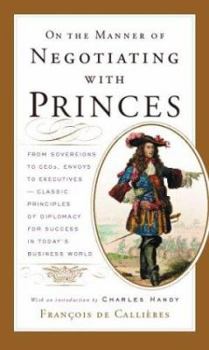On the Manner of Negotiating with Princes
Select Format
Select Condition 
Book Overview
Houghton Mifflin dusts off some treasures for a new From the Archives series. One charming French diplomat under King Louis XIV gave such valuable, timeless advice for diplomacy that even business... This description may be from another edition of this product.
Format:Paperback
Language:English
ISBN:0618055126
ISBN13:9780618055128
Release Date:May 2000
Publisher:Houghton Mifflin
Length:110 Pages
Weight:0.72 lbs.
Dimensions:0.8" x 5.9" x 9.2"
Customer Reviews
4 ratings
Interesting Book
Published by Thriftbooks.com User , 16 years ago
This was purchased for a Romanian co-worker as required reading for a class. He really enjoyed the book and thought it was interesting how it's principals have endured through the years.
How to be wiser than your fellows
Published by Thriftbooks.com User , 22 years ago
Shouldn't peoples get smarter as decades and centuries pass? This book, written roughly 300 years ago by the "envoy extraordinary" of French King Louis XIV, might make you doubt our progress. While I don't agree with all that Callieres wrote (specifically, his more 'intriguing' prescriptions), there is a wisdom and thoughtfulness in his writings that is unmatched by any modern text. With the explosion in wealth, and scientific and technical knowledge, it is hard to find evidence--in writing or in life--that we have become more wise. "How much better is it to get wisdom than gold! and to get understanding rather to be chosen than silver!" - Proverbs 16:16
Timeless Advice About Being an Effective Agent
Published by Thriftbooks.com User , 24 years ago
This book was originally written as a letter to the Duc d'Orleans who was the regent for Louis XV while he was a boy. De Callieres had been an envoy extraordinary for Louis XIV who had recently died. The Duc d'Orleans is famous in history for being putty in the hands of John Law, leading to the debasement of the French currency and the collapse of the Mississippi Bubble (see Millionaire for details). In the letter, the hidden agenda was to convince the Duc to let career diplomats from good families do the ambassadorial tasks, emphasizing peace over hostilities. Louis XIV had virtually bankrupted France with his many long and expensive wars that provided little benefit. Without a more sensible foreign policy, France was in serious trouble. Based on his past behavior patterns, the Duc was likely to send his card-playing buddies from the military ranks to take on these chores, and diplomatic disaster was likely to follow. The first two-thirds of the book is a Renaissance-like description of the ideal man (there was not much role for women in his mind, other than as people to use as sources of indirect influence on princes). The description is obviously overstated to make a point: There's no one this good, but you'd better look for the best person you can. The final third is full of day-to-day advice about what a diplomat must do (sort of Diplomacy 101 for those who have not done it before). This includes details how to be introduced at court, the role of your own spies, and so forth. The final third seems remarkably modern. Perhaps it is even used in some diplomatic training today.The only puzzling thing about the book is the introduction by Charles Handy. In the introduction, Handy argues that you can take the word 'negotiating' in the text and substitute the word 'management.' In so doing, he tries to transform this into a treatise on management. I don't think so. Sure, there are areas where management issues come up, such as in the selection of diplomatic personnel, but that's not the focus of this book either directly or indirectly. If he had argued that this book was the How to Win Friends and Influence People of the 18th century, I would have agreed with that. I'd skip the introduction. It will only confuse matters for you, and throw you off the track of what the book is really about -- being a loyal agent for someone with whom you are not in daily contact but whose most important matters are in your hands. The modern-day equivalent would be handling an labor negotiation for a company in an inaccessible foreign location. The Prince is like the 800 pound gorilla. He can sit wherever he wants, so the task of negotiating with him is a delicate one. If you've ever had a boss like that, you'll find it humorous to compare your former boss to the descriptions in this book.If the publisher does want to turn this into a management book, I suggest a different approach. Combine the text of
Past meets Present
Published by Thriftbooks.com User , 24 years ago
I liked the book a lot. It showed how things were handled in the past and applied it to real world situations in the present.





